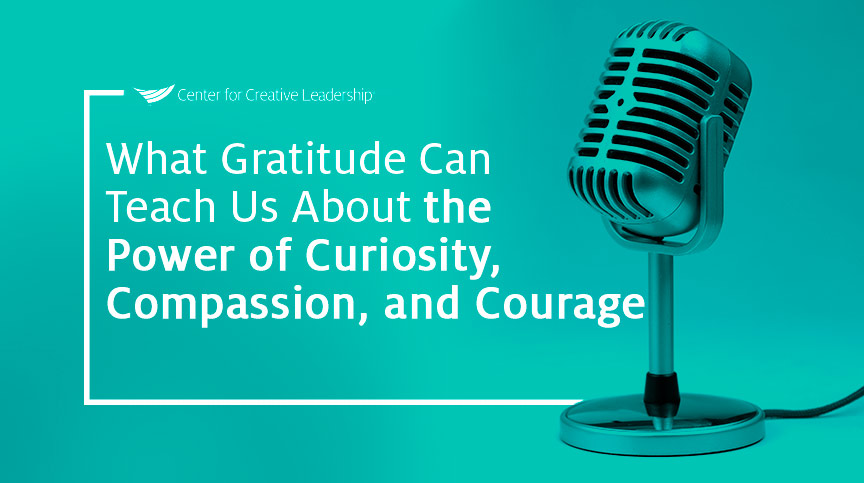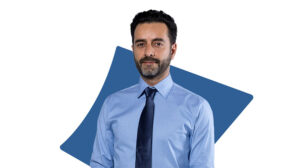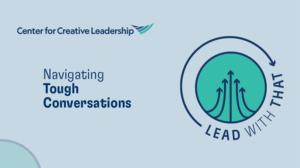- PODCAST
Lead With That: What Gratitude Can Teach Us About the 3 C’s: Curiosity, Compassion & Courage

In this season of thanks, we wanted to have a discussion about what we’re thankful for, and how leaders with a mindset of gratitude support both individual and organizational wellbeing. We also explore the concepts of curiosity, compassion, and courage — or “the 3 C’s” of leadership — and how they connect with gratitude and resilience.
In this episode of Lead With That, we’re giving some thanks and thinking about the importance of compassionate, courageous, curious leaders. Compassion for others starts with self-compassion, and those who lead themselves thoughtfully and with kindness lead others within their organizations or communities compassionately, too. Leaders who facilitate environments of gratitude also create psychological safety, promote innovation, and enhance wellbeing (both for themselves, as well as others on their teams). So, let’s get comfortable with being uncomfortable, and bring gratitude — and the 3 C’s of curiosity, compassion, and courage — to all we do, and lead with that.
Listen to the Podcast
Join CCL’s Ren Washington and Allison Barr as they talk about the importance of gratitude and facilitating environments where we can be grateful.
Interview Transcript
INTRO:
Welcome back to CCL’s podcast, Lead With That, where we talk current events in pop culture to look at where leadership is happening and what’s happening with leadership.
Ren:
You’ve heard us say before, but sometimes it’s hard to find something good about leaders and leadership to talk about. And while we know recently in America there’s loads to talk about from a leadership perspective, we decided to take a slightly different angle today. In this season of thanks, we wanted to be very intentional about having a discussion of the importance of gratitude. As one of our epic colleagues, Pete Ronayne, says, “Gratitude and gratitude giving is one of those key components of burning brighter in the face of all that burnout.”
And so today I took on the challenge, and I challenge Allison as well, for us to think a little bit more about what we’ve been grateful for this year. The kind of leaders and leadership that has been out there that I felt proud of.
Because truthfully, there’s more good out there. There’s more of you doing good out there than not. And so I’m excited to hear what Allison is thankful for. I’m excited for you to think about what you’re grateful for, and I can’t wait to talk about some of the things that I’ve been thankful for. Today we’ll be giving some thanks, sharing some gratitude, and thinking about leaders in leadership, the importance of facilitating environments where we can be grateful, and an environment where we can be grateful for.
Welcome back everyone. I’m Ren Washington, and as usual, I’m joined with Allison Barr. Allison, what do you think about when you hear the word gratitude?
Allison:
You know Ren, as I listen to your introduction to our podcast today … And for our listeners, for what it’s worth, we don’t script, and we don’t hear what each other is going to say prior to recording. So as I listen to your introduction, I can’t help but admit that I’m going to spin us a little, and I’m sorry.
Ren:
No apologies necessary, please. One might say I’m grateful for the opportunity, Allison.
Allison:
Aw, shucks. So had you asked me last week, I would’ve had a very different response. And I think what this podcast might highlight for me is the importance of holding 2 truths together at once.
So gratitude for me, had you asked me on Friday for example, I might have said something like, “Gratitude means being thankful, appreciative for not only just the people around me, but my community and everything that I have in my life.” And I should say today is November 22nd. There was a mass shooting in my community 3 days ago in Colorado Springs. Gratitude right now feels … Maybe inappropriate might be too strong of a word. Community feels more appropriate to me right now.
So I suppose I can say I’m grateful for my community coming together. However, I want to highlight that I think many feelings and actions can exist at the same time. And I refuse to normalize mass shootings and I refuse to skirt over it and pretend like nothing’s happened. And also highlighting you can have a lot of feelings and actions at the same time. So I am also grateful for my community and the way they’ve been coming together the past few days.
Ren:
Yeah. Allison, thank you. I really appreciate you saying that. And you’re so right. You’re all too right. I know maybe we’re trying to take a different posture today, but we can’t help but be honest about what’s happening around us and in the homes and cities and communities that we live in. And so my heart goes out to you and everyone in Colorado Springs. As you know, Allison, and some of our listeners, I lived in Colorado Springs for 16 years. My parents-in-law still live up in the north side of town, and so we’re thinking about you all.
And too, part of I think what gratitude is for me, I was thinking about this idea of grateful leaders or gratitude in leadership and then this list came up of what makes a great leader. And so that’s interesting. And then there’s this thing, this frame, that looked at, “Well, maybe this connection part of leadership is one of those things that we can be grateful for.” And so when I think of leaders or leadership or “the social process of leadership” — at CCL, what we say — I’m often grateful for a community finding a way to come together in the face of horror and unite and lift one another. So thanks again. I’m glad you said that.
Allison:
Yeah, and I think too what you just said made me think of leadership and it is a social process, as you just said. And it’s not simply a means to productivity, though that’s part of it in the business world, it’s also a means to elevate others, like you just said. And having that mindset of gratitude certainly can help to elevate those around you.
And I think that from 2020 to now, and perhaps maybe continuing on (though I say that with fingers crossed), there’s been some uncertainties and volatility that we’re all experiencing and it seems to be perpetual these days and it has affected workplaces, it’s impacted communities in various ways, and it does require a new mindset. So when you say a gratitude mindset, when we talk about “burning bright versus burning out,” it’s different. I’d say it’s different now than if we were talking about this in 2019.
And what I think is so fascinating is that some of our more recent research here at CCL found that there are 3 critical mindsets that can help leaders to manage reactions to manage ambiguity, to manage volatility, to connect with others as you said, and really create powerful results together in the midst of that disruption. And so that all of them require different means of strength, resiliency, to some respect, and vulnerability as well. So those mindsets are curiosity, courage, and compassion. And of course, gratitude fits in there as well. Probably in all 3 of those areas as well. So what do you think, Ren, about those 3 mindsets? Do you think those are “the new leader” moving forward?
Ren:
And just to target it one more time, say it again. The 3 mindsets are…
Allison:
Curiosity, courage, and compassion.
Ren:
I love the 3 C’s: Curiosity, courage, and compassion. That the model of the new leader, probably a model of really effective leadership, I think most of the good leaders that have impacted me, and/or that have impacted groups that I operate in, or teams that I appreciate, or organizations that I’m proud of, I’d say those things are pretty common. When I think about gratitude in the context of our conversation today, a lot of what you said there is, how it can cultivate gratitude and support of burnout and those kind of perspectives. Something about compassion I’m a big fan of, for internal compassion, grace towards yourself, curiosity about yourself too. Why not courage in the face of being yourself? So those things are cool and resonate with me.
But also I wonder those things as it shifts to the environments, I’m really grateful for environments that foster innovation, environments that cultivate risk-taking, that enable “failing fast to win long,” as I might say. Yeah, I was looking around at this idea of innovation, and why am I grateful for it? It’s holiday season, Black Friday is on the march, Cyber Monday, you’re getting hit with this bevy of innovations. And I was in this conference with this group of leaders and we were all just having this conversation how so often people want innovation, they want change, they expect it around them. And then when they look at their own behaviors, there’s this pause, and this, “I don’t know if we should do this.” And so maybe I’m grateful for leaders that can cultivate an environment where we look at our practices and we say, “It’s okay to change what you’ve done. It’s not a referendum on what you’ve done in the past. It’s just a recognition that we all need to go forward.”
Allison:
Yeah, and it takes courage to do that. Don’t you think? It can.
Ren:
I don’t know why. Why?
Allison:
I’d say it can.
Ren:
Why does it take courage? I don’t know. Yeah, help me understand.
Allison:
I share the same perspective as you. I value, and I love, innovation. It’s important too for business growth. And I’ve worked in environments, not at CCL, but I’ve worked in environments where people hold tightly to tradition. And to be in that kind of environment, some of our listeners might be, and to push up against “the tradition,” quote, unquote. The traditional culture that exists that your organization can take courage. It can. Because you’re going against the norm and you might be saying to some people … What they hear rather is, “You have to change. You have change everything.” And that’s not necessarily what we’re saying. It’s just progression, right? You can have innovation and tradition at the same time. So I think those organizations that hold tightly to tradition, you probably do need some courage to speak up about that.
Ren:
Got you. So it’s not that innovation in and of itself is courageous, it’s just that typically innovation then requires one to look at the establishment and say, “Hey, you there, maybe we should think of things differently.”
Allison:
Well, now that you say it, yes to that. And it can be both. It can be the active innovation, even if you are an environment that cultivates it, can also be courageous. If you’re innovating a new product that has worked just fine and you’re making changes to it, that can be courageous. That can involve some courage, as an example.
Ren:
And where I see that too, and I think the impetus of this first leg of gratitude for me is that at the fringes of science … Eh, maybe not the fringes, that’s too spicy. But at the frontier of science, especially neuroscience, biotech, I mean, there’s all these companies right now and for whatever you think of traditional science or the FDA, I know that ALS or what’s also known as Lou Gehrig’s disease is really, really impacting so many people across the world and is typically nearly always fatal. And there’s these new pharmaceutical companies that are at that forefront trying to find these treatments for ALS. I mean, these approved, where they’re actually getting good results from peer-reviewed studies and appropriately manage things that are coming out into the market too, maybe even also there to fight against and manage Alzheimer’s as well. And so when I think about the idea that the generations behind us will hopefully create an environment where the ails for today no longer exist, I mean, I’m grateful for anyone who would create an environment that would say, “Maybe today’s solutions aren’t the answers to tomorrow’s problems.”
Allison:
Absolutely. I couldn’t agree more. And I have to tell you, I’m not trying to be cheesy, but I’m grateful that you just brought that up because I’ll share with you, last night, my partner Roger and I, we took his daughter out to dinner with the — I think we’re calling him “the boyfriend.” So I hesitate to say that. So if she’s listening, she can correct me here. But I think we’re calling him “the boyfriend.”
Ren:
Let’s call him the boyfriend.
Allison:
Well, they’re minors, so I don’t want to give names.
Ren:
Okay. No titles. We’re cool and hip kids, because we say things like “cool” and “hip.” So we don’t need titles. It’s cool, it’s cool.
Allison:
Anyway, this is the 16-year-old by the way, we were asking him about school and life and what’s going on in his world. And he shared with us that he started the biggest club and the most successful club at his school. And we asked him, “What’s that about?” And he said, “Oh, we do random acts of kindness and it’s the most popular club at our school. And it’s so much fun and we really enjoy doing it.”
So I’m segueing here a little bit, but you talked about generations, younger generations, maybe finding new solutions to problems. And I very much appreciate the younger generations and what they’re doing. And that would be another example too. Times are tough. And for a 16-year-old to, by himself, start his own club, gather a bunch of people at school, as well as teachers and volunteers, to help spread random acts of kindness in our community, it does warm my heart. It does.
Ren:
Well, I am grateful for those that design with all of us in mind. And so often I look around and I just feel so thankful that I’m here because of so many people. So many people who I know, who I don’t know, have helped forged a path for me here. And I was reading this really cool story around these parks departments across the country are beginning to offer free all-terrain wheelchairs at their visitor centers for disabled peoples to explore these natural reserves in these state parks. I mean, Colorado, Michigan, South Dakota, just some of them. And one of the consultants for it said, “We just want to create an unforgettable outdoor experience for everyone.” And my family is big on hiking and big on nature, and my kids really love being in nature. And my wife. My God, they need it. Sometimes I need to just say, “Go outside because you’re getting a little bit too inundated with the tech.” And for so many people, they don’t have access to that.
And so now, I just love someone who’s saying, “Well, why not? What’s stopping us?” And what an interesting story about this young man saying, “Why not be kind? What’s stopping us?” And maybe that goes back to the first environment of, how do you cultivate an environment where people fail fast, and they say, “Why not?” And then really we believe maybe this thing that we always hear in leaders or leadership where we assume positive intent. Well, maybe I’m going to throw in an extra gratitude. I am grateful for the chances, the times that I can assume positive intent because it typically works better for me and the people I’m involved with.
Allison:
Absolutely. And I want you, if you don’t mind, to clarify what does “failing fast” mean for those of us who haven’t heard that term before?
Ren:
Yeah, thanks. I use it a couple times and maybe, for me, it means this idea of an environment where we’re not so scared to fail that we keep on doing the same things, because excellence is the only thing that we know. Or rather, failure is so abhorrent. And so “fail fast” is take risks, learn what’s wrong, break it early, let’s get through the process of validating and checking, and let’s fail as often and as frequently as we can in the beginning. So by the time we’re done with the process, we have something that’s refined, something that’s perfected, something that we’re not afraid to pressure-test.
I think so many people tiptoe through solutions or then it finally hits the market, or it finally hits their people’s ears, and then all of a sudden it crumbles and “What happened?” Well, we didn’t explore any of this because no one was enabled or felt courageous enough or had the courage or felt empowered enough to say, “Hey, something’s broken.” So a long-winded way, as my way, to say: Fail fast is an idea that Let’s just quickly get all of the bad stuff out of the way, as opposed to waiting and pretending nothing’s broken, so we have a better product at the end.
Allison:
This might be another podcast you might say to me, “Let’s sidebar that;” however, I’m going to ask you anyway: If you’re a leader, how do you cultivate that environment?
Ren:
An environment for failing fast?
Allison:
Yes.
Ren:
I imagine it’s some of the social contracting that has to exist in the layers of leadership and throughout the organization. I mean, you could have a culture of, “On my team, we fail fast,” and then someone misses the mark and then they’re summarily fired, or put on a performance improvement plan. And so that’s what I would say some incongruence with team functioning in the organizational hierarchy. So some of you might be listening like, “Great Ren, thanks a bunch. Fail fast. Also, no can do. They fire people out here for failing.” And I would look around you and say, “Well, what kind of environments can you provide enough safety for one another where you can practice those things while your maniacal boss shakes a fist at failure?” So that’s a larger conversation.
I think I would say, probably you and I align and we say, “Hey, what is our appetite for failure? What is an acceptable means for missing the mark? What does appropriate risk-taking look like?” You and I might just have to really define these things. And I mean, it’s direction, it’s alignment, and it’s commitment. It’s these early conversations we have as team members where we say, “What does failure look like? What does success look like?” And then you and I agree that every time we tap into a new project, we just do a quick reset because not every failure looks the same for every bit of work. I don’t know. Does that work?
Allison:
Yeah, that works. We can come back to it if we decide to in another episode.
Ren:
Yeah, we might have to.
Allison:
And in your highlighting, part of the 3 C’s again too, the curiosity. The curiosity part in that, to have an environment that nourishes failing fast, also involves that curiosity mindset. I’ll give you an example. And again, truly grateful that I get to work with my partner Abigail, who works in our societal impact department and equity, diversity, inclusion. And she and I were working our project yesterday and I said to her, “I just need to verbally process and say a bunch of things that are wrong first. Because I get those out of the way, I’m a verbal processor and then I’ll eventually get to it.” And she said, “Okay, great. Just start talking.” So I start talking, she’s asking me detailed questions and eventually we get there. So that social contracting and the curiosity can really create an environment at the workplace, one, of emerging leaders, shared leadership. And two, of psychological safety. You allow people to share ideas and potential innovation as well.
Ren:
I’m coming around on the 3 C’s, Allison, I got to tell you. At first, I was like, “Okay cool. Another frame, another 3 C’s. We like it.” Humans love alliteration, especially Americans. But yes, I think there’s so much in this idea of gratitude for innovation, for failure, to look around you with perspective. I think gratitude gives us perspective. I look around at a “failure,” doing our air quote thing here, in our organizations and we go, “Okay, yeah, that’s a miss, but does it benefit?” And typically, because we look at our organizations and the thriving businesses that exist because of the people who take risks and learn from those risks. And I see a lot of this happening where times are tough and leaders innovate and they get in there and they push through the curve and then times get better and times get comfortable.
Maybe they lose sight of that and it gets uncomfortable to dive back into those spaces. And so maybe with curiosity, maybe with the courageous behavior, and then too, compassion is such a big thing for me. If I could write anything about the importance of compassion towards yourself and another, I think it cultivates that ability to take risks. I mean, how often is it that we are our harshest critic? And I think that’s so true so many high performers. And then they don’t want to take risks because they don’t want to be chastised by others, but really by themselves. I mean, that’s what we always talk about with growth mindset and the learning curve. People “quit the dip” because they’re like, “This sucks being down here,” but maybe it only sucks because we’re so cruel to ourselves about it. And so maybe with some compassion all of a sudden we’re innovating.
Allison:
Why do you think people are so hard on themselves?
Ren:
Well, our puritanical ethos probably. Hundreds of years of, “All work and no play makes Jack a dull boy,” I think probably. But no, when I look around the globe and, I think honestly, around a lack of self-acceptance, a lack of clarity on what I care about and why. You were talking about Roger’s daughter and the young man who seems to care about kindness. And my daughter, she’s a senior in high school, she’s on the way to college and we’re having these real conversations around self-validation. And so many teenagers, and I remember it, and I think so many adults struggle with this idea of being okay with who they are because they know what they want and why.
And I think for so many people that’s so murky. And so there’s no compassion for self because you look around at the behavior that’s rewarded, you look around at the behavior that’s punished and you’re like, “I don’t know, maybe this weird self-flagellation thing is what we’re all supposed to be doing.” When I think the science and the data and the anecdotes point to communities and cultures that have courage and curiosity and compassion, as you were saying and as I’m coming around to, create an environment of innovation. So I don’t know why people are mean to themselves? Why do you think people are mean to themselves? Why can’t they be compassionate?
Allison:
There’s probably a lot of varying reasons. Depends on the culture that you were raised in, what you become accustomed to, the environment around you, what you were socialized to do, what you saw your parents model. Human beings are so complex. I don’t know the answer. It depends. I can be hard on myself because I like to produce quality work. I’ve done a lot of self work around that, but if I think back to 10 years ago, gosh, my own worst critic and I can guarantee you that other people were not thinking about my failures as much as I thought they were. So if I could offer anyone that advice, people are not honing in on your failures in the way that you think that they are. So who knows? I mean, there’s probably a variety of reasons, but self-compassion is a great thing to focus on for any leader.
As we say at the Center, and as you probably hear a lot of clichés, “You have to focus on yourself in order to lead others.” You have to lead yourself to lead others, you have to put on your oxygen mask first in order to help others. It’s very cliché but it’s also very, very true. So that’s self-compassion, self-courage, self-curiosity first is crucial. And I do want to add though, not to get too hung up on self, self, self, because if you’re only focused on self, then you’re limiting how you might nourish those around you and how you might nourish the collective. And I also think sometimes we get really hung up as a culture on self, self, self. When community can also help you to focus on yourself while also healing the community at the same time. You can have both.
Ren:
That’s an interesting juxtaposition because I don’t know if I would consider people’s index on the self, like you’re talking about, the self, self, self as an example of true air mask first. I would say that self, self, self is in service of the wrong communities. It’s like in service of seeking acceptance and validation from places that don’t value you, will never accept you, and so you model a self that doesn’t reflect who and what you are. And real acceptance and inclusion, and I’m grateful for people who do that, look at you and say, “You’re welcome here. Your true self is welcome here.” And in service of yourself, maybe you’ll serve the community or maybe in service of the community you’ll find yourself.
So I hear you and, I mean, unsurprisingly, I think we agree on that. What I think from a leadership standpoint again, and what an interesting story you said around the boyfriend, because we’re calling him the boyfriend, is that he seems to have a keen, or at least his group, seems to know something around their value. And if you can tether what people value to what they’re grateful for or vice versa, then you can create these virtuous cycles that start to perpetuate positivity through your environment. And so I guess as a leader, again, What does value-driven leadership look like? How can you demonstrate gratitude for risk-taking, for innovation, for someone walking the talk? Maybe that’s how you can capture some of that.
Allison:
Yeah, perhaps. Two things; we’re calling him “the boyfriend” because he’s a minor. So I just want to clarify that. He’s a minor, I’m not going to say his name on a public podcast, that’s why we’re calling him the boyfriend …
Ren:
Oh no. Yeah, totally.
Allison:
… Call him a friend, if that’s better. Anyhow …
Ren:
And clarify for me, I’m just calling him the boyfriend because I think that’s hilarious. And I have a teenage daughter too, so my job is basically to make them embarrassed. So I’m just doing my job.
Allison:
Okay. Good job. Good job.
Ren:
Yep, thank you.
Allison:
So if you’re a parent and you’re listening, your job is to embarrass your children, as Ren just said. Sound bite.
Ren:
It’s a polarity. We’re talking a lot about polarities.
Allison:
Okay. Regardless, I think there’s nuances to everything. That almost nothing is black and white except for nothing is black and white. That’s the only black and white statement I would make. Everything is nuanced. What I want to clarify and what I’m saying is I do think we live in a culture, not everywhere of course, where it is self, self, self, “What can I do to succeed? What can I do to buy the house? What can I do to get the next role? What can …? Me, me, me.” It is phrased as self-development. I mean, sure. However, when we talk about leadership, it is a social process. And there are times when those around you can support you in your development. It does not always have to be, “How can I solve this myself? What can I do?” That’s harmful and you won’t get the best out of a group anyway. A community, a team at the workplace, a whole organization. Could you imagine if at CCL you never reached out to anyone for anything?
Ren:
Yes.
Allison:
How would that go if you were making a custom design with some material that the client asked for that you weren’t familiar with, you’d probably do fine because you’re a smart human. But if your job was always to do that and you never reached out to anybody and you never got fresh perspectives, you never asked the Pete Ronayne, “Hey, what are some other ways I can look at gratitude?” You’re limited. And your “product,” quote, unquote, your product is going to get old very fast.
Ren:
Yeah, we do say flourishing is not a solo endeavor.
Allison:
Truth.
Ren:
Yeah. And I think there’s probably plenty of people out there who would look around themselves and say, “Well, not for me.” And again, I don’t know if we’re here to debate or change anyone’s mind to that end, but I think what you’re highlighting is something important around the recognition of the amplification of the social processing of the leadership. And I think when we engage each other in those spaces being … Yeah, as we talk about this, I’m saying maybe part of gratitude is humility. Being humble enough to ask for help, of being in an environment where people demonstrate gratitude for the asking for the help.
And so I keep on coming back, maybe the best way to do all of this, as whoever’s listening, is whether or not you feel fully empowered to create environments that put a priority on courage and curiosity. And compassion is that you yourself might be able to model some of those behaviors in a way that you can control your reactions to the way things are operating. And I’m always reminded that that’s what all of us have a choice every time in the face of an organization is to do nothing or shrug our shoulders or create a random acts of kindness club and then maybe it becomes the most popular club around.
Allison:
Right. And then what? The mission of that club is doing some good. It’s doing some good out there. I don’t think anyone would dispute that spreading kindness is a good thing. We might have one or two out there who would, but most people would say, “Wow, that’s really great.” And in the act of practicing what I preach, curiosity, there’s some interesting science around gratitude as well that the act of gratitude can produce serotonin, it can increase dopamine levels in the brain. And so I want to be cautious that I’m not suggesting that when there’s a mass shooting, you jump to gratitude.
I’m not saying that we should bypass when things are tough, but what I am saying is that the simple act of expressing gratitude can change some chemicals in your brain and shift your perspective in the process as well. There’s a lot of times in programs I might say, “Hey, you’re going to take 5 minutes, have a conversation with your partner, and just share all the things that you’re grateful for.” And then I ask, “How do you feel after doing that?” And I don’t tell them the science first, right? People usually feel pretty good. So there’s some science around gratitude that’s just fascinating.
Ren:
When I think about the brain chemistry involved in the gratitude-giving, I think about one tool in a very vast toolkit. You’re absolutely right that if something traumatic happens, you don’t necessarily need to jump right to gratitude. And gratitude is one of those tools I use when feeling stressed, when feeling overwhelmed, when feeling sad, when feeling depleted. And there’d be reasons why; because of serotonin and dopamine. And what an interesting challenge for you to see if you can get enough serotonin and dopamine from being gracious enough. That’d be an interesting exercise for 40 days. But I think the big message for me in this whole space is the pause. I’m really coming around on the courage and the curiosity and mostly the compassion. And maybe that’s the link there and then what all of that does for our perspective taking.
I think what you were talking about earlier around the individual versus the group, and would you thrive alone if you didn’t reach out? And I know there’s a lot of folks who have to thrive alone and it’s okay too. That’s be compassionate to self and then maybe let the community lift you up and amplify you. I always think leaders are force multiplied. Be a leader someone can be grateful for. Try to be your best self for people. Because you’re a leader whether or not you have a title. And so you, listener, are a leader for someone and you are in a position for someone to be grateful for. And so something you said too, Allison, really resonates for me around this idea of the self first, the me, me, me and self as service. What if I sharpened all of my saws for self in service of others? A lot of my energy comes from in the continuum of harmony versus challenging in the continuum versus creating the group first as opposed to meeting my own needs.
I recognize that I need to be really sure that my gas tank is full before I can facilitate for others. And so for me, and we talk about this networking all the time in our programs, especially the work that I’m doing is, people don’t like to network because they don’t want to be like, “Oh Allison, how can you help me? Or who can I step on to get where I’m going?” I’m like, “No, what if you just had a really keen awareness of what you were good at and then highlighting who around you is doing the work that you want to do and say, ‘Hey, how can I help?’” And what was it look like to actively and functionally say, “I’m working on this to help people.”? Let’s go back to the boyfriend. There had to be some kind of awareness. Maybe not. Maybe there was some unconscious competence.
But I look at that exercise and I think, “Well, maybe this person said, ‘Okay, well I like to connect with people. It’s something I’m pretty good at. I can cultivate this environment. It’s something I’ve worked on. And hey, look, I can use it for positive means.’” And I only think self, self, self is bad when it’s used for negative means. It might go back to our conversation, does altruism matter? Would it matter if the boyfriend was only doing that to stroke his own ego if he’s got the most popular club in school and the most popular club in school is called random acts of kindness? That’d be a positive outcome for ego stroking. So I just said a whole bunch there, but it reminds me just to round all of the gratitude that I have for you for listening, Allison.
Allison:
So there’s so many things in my brain from what you’ve just said. So we can come back. And I am grateful because you and I have a lot of really impactful conversations that cause me to think in new ways and cause me to be curious and think about how can I look at this differently? And I very much appreciate that we can come to these recordings and not literally look at a script and have these unique conversations. And the first thing I want to say is … So we’ll come back to this, I hope, in another podcast. I don’t think it’s good to focus holistically on self. So I digress. I’ll come back to that.
Ren:
Ooh, okay. That’s the next one. The self versus the other.
Allison:
What this highlights for me is something you already said too, which is a spectrum. Everything exists on a spectrum. Today I might be focused on myself because I’m trying to process my emotions of what happened in this community. That’s okay. But if I did that every single day of my life, probably not a good thing. Focusing on myself only I mean. We’ll come back to that if we choose. And I think —
Ren:
I think we agree.
Allison:
What this conversation highlights for me is if you are a leader who’s experiencing a lot of disruption at the workplace, or not even, try focusing on one of those 3 mindsets this week. Try asking yourself, “How can I be more curious today? How can I be more courageous today? How can I be more compassionate today?” And depending on the environment you are in, you might need to direct those to yourself first. It just depends. However, I would challenge you, if you are listening, to try to focus on one of those 3 C’s this week and see what happens. Just see what happens. I also have to give credit where credit is due, because those 3 C’s come from Karissa McKenna at CCL, and part of her team and portfolio. They developed the 3 C’s in our LDP program, Leadership Development Program, which is amazing.
And I was looking into it today as I’m designing some other content for another program. So the timing was perfect for me to be looking at that this morning because it really resonated with me, especially when there’s disruption in your environment as those 3 mindsets being crucial for you to be able to move forward in a leaderly way, so to speak. So that said, to our listeners, our challenge is to you: How can you be more curious? How can you be more courageous? How can you be more compassionate?
And I have to give a special heartfelt gratitude to Emily and Ryan who are behind the scenes. They always make our podcast happen so seamlessly. So we are grateful for you. And I also want to acknowledge that, again, today’s the 22nd of November. There are 15-plus different holidays that happen between now and January 1st. So, a very happy holiday season to all of you! You can find all of our show notes and episodes on ccl.org and we look forward to connecting with you next time. Thanks, Ren.
Ren:
Thanks Allison. And thank you everyone. We’re grateful for you too. Find Allison on TikTok.
Allison:
Thanks everyone.
Ren:
See you next time.
| Related Solutions
Sign Up for Newsletters
Don’t miss a single insight! Get our latest cutting-edge, research-based leadership content sent directly to your inbox.







